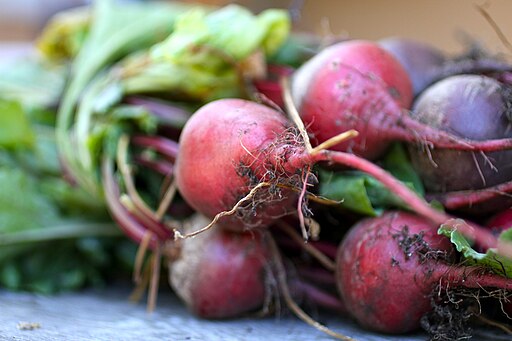
Beet juice looks like blood itself, oozing out of the vegetable as you chop it. It stains your hands, your knife, and saturates entire pots of soup with its vivid colour. The red is so brilliant and rich that it’s commonly used as a natural food colouring, brightening other foods with its vibrant hue. If colour is an indicator of nutritional value, then it’s no surprise to find that beets are packed with iron, calcium, B vitamins, and antioxidants. Really, we should all be incorporating more beets into our diet.
Now, new studies are showing that we have even more reason to eat beets. One study done by the London School of Medicine found that drinking 2 cups of beet juice a day can lower high blood pressure. Another found that beet juice increases stamina, helping individuals exercise 16 percent longer than controls who are not given beet juice.
Even better, there is now evidence that beets may be able to slow the progression of Alzheimer’s disease and other forms of dementia. Researchers at Wake Forest University recruited older, sedentary individuals, and then divided them into groups. The average age of all participants was 65. One group was given beetroot juice to drink before starting an exercise regimen. The other group also exercised but was only given a placebo. Before and after the trial, MRIs were taken of all participants to see if any changes were made to the brain.
At the end of six weeks, both groups showed improved neural connectivity in their brains, particularly in areas of mobility. However, the group that drank beet juice juice before exercising benefited more significantly. Excitingly, their MRIs showed brains comparable to those of 26 years olds.
Researchers suspect it is the high concentration of nitrate in beets which is responsible for this positive change. Nitrate is converted into nitrite in your body, and previous research has shown that nitrite widens blood vessels and increases blood flow, particularly to areas that are oxygen deprived.
When you exercise, you are inducing a state of oxygen deprivation, and this low-oxygen state stimulates the conversion of all that nitrate from the beets into nitric oxide, which then relaxes and dilates blood vessels, bringing more oxygen-rich blood exactly where it is needed. For the beet juice-drinking participants of the study, this oxygen-rich blood went to the white matter of the frontal lobes – the areas of the brain commonly associated with dementia.
This is not the first time that beets have been heralded, and I suspect it won’t be the last either. In yet more studies, beets have been shown to thin bile flow through the liver, helping to prevent liver and gallbladder problems. Their high fibre content has been linked with a reduced risk of some cancers, particularly colon cancer. Because beets are a good source of folate and betaine, they can also help to lower blood levels of homocysteine, which will reduce your risk of heart-attack. And beets are also a good source of lutein, an antioxidant which protects eyes from macular degeneration and cataracts. If there truly is a superfood, beets may be it.
The next time you go to your local grocery store, seek out some beets and take note of that spectacular life-giving red colour. Treat your body to a good dose of it. It may be the closest thing to magic in a bottle.
About the Author: Rebecca Wong has a BA in English Literature from the University of Waterloo and has been working in the herbal business since 2000. She studied at the Ontario College of Traditional Chinese Medicine under respected authorities Paul Des Rosiers and Vu Le, and graduated from the East West School of Planetary Herbology under Michael Tierra. She received training as a yoga teacher at The Branches in Kitchener/Waterloo, and therapeutic yoga teacher training from the School for Somatic Soulwork under Deniz Aydoslu. She now teaches yoga for anxiety, depression and burnout at Rebecca's Restful Yoga Studio in Toronto.

I worried ?= about nitrate , and the fact it dilate blood vessel? . Can i eat them , onece a week? Or?????=
Yes, the nitrates in beets do dilate blood vessels. When blood vessels dilate, or relax, it helps to lower blood pressure. It can also prevent, or reverse angina by increasing the flow of blood and oxygen into the heart muscle. In this way, the nitrates in beets can be very good for heart attack and stroke prevention.
According to Chinese medicine, beets are also said to “nourish blood”, meaning they can help to cure or prevent anemia. As beets are a very nourishing food, I see no reason why you couldn’t eat them several times a week, if you can. For those who are struggling with pain due to gallstones, a smoothie made primarily with beets can be consumed every day until the pain stops.
Dear Rebecca,
Thank you very much for the wonderful SensibleHealth products and web site with the interesting articles, even if the one about the case of teenage blindness through wrong diet was really sad – the information it contains is vital to know. Your post of July 20th about beets is very helpful and will endeavour to include more in my smoothies since I have gall stones.
Wishing you a happy peaceful and successful 2020.
Kind regards,
Deborah